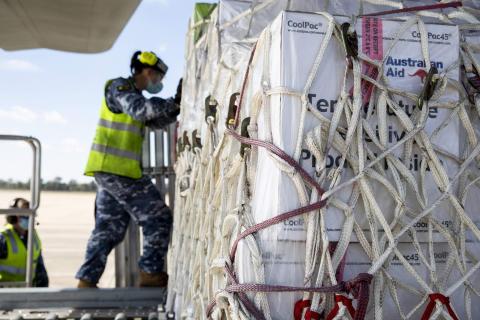 The Abbott Government will next week bring down its first aid budget, a budget which itself will contain two interesting firsts: it is the first since the integration of the Department of Foreign Affairs and Trade (DFAT) with AusAID, and the first since the transition of the very expensive Regional Assistance Mission to Solomon Islands (RAMSI) to a policing-only mission.
The Abbott Government will next week bring down its first aid budget, a budget which itself will contain two interesting firsts: it is the first since the integration of the Department of Foreign Affairs and Trade (DFAT) with AusAID, and the first since the transition of the very expensive Regional Assistance Mission to Solomon Islands (RAMSI) to a policing-only mission.
In a new Lowy Institute Analysis out today, I argue that the Abbott Government can draw some important lessons from Australia's experience in RAMSI as it moves forward with its ambitions to align Australia's foreign, trade and aid policies.
Australia has just spent $2.6 billion (in constant prices) in a decade-long engagement in Solomon Islands in which it aligned foreign, aid, economic and security policies.
I argue this was a massive and disproportionate investment to restore stability in a small country, which became and remains today the third largest recipient of Australian aid. RAMSI expenditure, 95% of which was covered by the Australian Government, also saw Solomon Islands move from being the 35th most aid-dependent country in the world before 2003 to being the second most aid-dependent country in the world by 2009.
Although RAMSI was undoubtedly costly, it had some impressive results.
The Mission restored law and order in Solomon Islands in fairly quick order. RAMSI assistance also helped reconstitute a shattered economy and was instrumental in rebuilding the machinery of government. These successes were largely due to Australia's decision to establish a unique whole of government approach to its leadership of the mission, involving DFAT, AusAID, Finance, Treasury, Defence and the Australian Federal Police in a united effort.
Successes were also due to the effective cooperation established with New Zealand and other members of the Pacific Islands Forum. Although Australia provided most of the funding, the regional nature of the Mission, which saw defence and police officers and some public servants from other Pacific Island countries work together and alongside Solomon Islands counterparts, was critical in leveraging political and popular support for RAMSI's work.
Even if Australia does not lead another large-scale intervention in the Pacific, the need for external assistance in Papua New Guinea and Pacific Island countries for a variety of governance, economic and security challenges is unlikely to disappear. So the lessons of RAMSI are relevant for responses to such challenges. Here are four that feature in my Analysis paper: [fold]
1. Australia's experience of cooperating with the security forces of Pacific Island countries could be built on by involving regional defence and police forces in future responses to natural disasters in the region.
2. The placement of Australian officials in frontline positions in the Solomon Islands government helped resolve some immediate challenges, particularly in policing but also in government finances. Over time, however, this approach was not as effective as it might have been in building the capacity and skills of local officials. Future efforts to provide this kind of support in the Pacific may be better targeted by focusing on building local capacity at an earlier stage.
3. Despite RAMSI's significant efforts to improve economic governance and the machinery of government, and assisting the passage of difficult legislative and bureaucratic reforms, it had no mandate to reform the political system of Solomon Islands. Unfortunately, the political system of Solomon Islands encourages the political class to undermine the rule of law and ignore governance reforms in a quest to accumulate funds that will support their re-election. All MPs have the potential to exert influence in making the machinery of government work and to promote the rule of law, but a lack of support from Solomon Islands MPs may threaten the enduring positive impact of the work of RAMSI.
It is extraordinarily difficult for Australia to influence positive change in the politics of Solomon Islands. And it is important to remember that improving government processes alone does not guarantee better governance in the long term. RAMSI was successful in convincing some politicians, but the lessons from RAMSI show that securing strong political ownership of and support for governance reforms is as important as assisting in the implementation of reforms.
4. The alignment of the operations of Australian government agencies and their cooperation with regional counterparts made for some good results in Solomon Islands. But the large number of players in RAMSI made it difficult to reach a common position on when the Mission should be drawn down. Progress was made at different rates and at different levels across the pillars of the mission, which meant the Mission stayed on to maximise its impact and also address new challenges but costs also increased beyond expectations.
The main lesson is the importance of agreeing on an exit strategy and on acceptable spending levels at an early stage of a mission, and employing the necessary tools to measure performance and impact.
The Audit Commission has recommended Australian aid be focused on 'nearby countries' where Australia's expertise and strategic interest is higher. This is consistent with the Abbott Government's outlook. As the Government implements this strategy, it is worth reflecting on and learning the lessons from a decade of intensive assistance in the nearby Solomon Islands.
Photo from Australian Department of Defence
